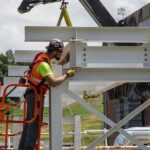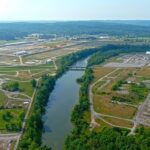The chairman of a nuclear safety board that provides recommendations and advice on public health and safety issues at certain federal facilities, including two in Oak Ridge, has proposed eliminating the board, according to an investigative news organization in Washington, D.C.
In its October 19 report, the nonprofit, nonpartisan Center for Public Integrity said it had obtained a June 29 letter from Sean Sullivan, the Republican chair of the Defense Nuclear Facilities Safety Board, to Mick Mulvaney, director of the White House’s Office of Management and Budget.
The center has posted the five-page letter online along with an attached one-page historical summary of the five-member board, which issues weekly reports for U.S. Department of Energy sites that include Oak Ridge National Laboratory and Y-12 National Security Complex, among other activities. In his letter, Sullivan said the board is a “relic of the Cold War-era defense establishment.”
The Defense Nuclear Facilities Safety Board is an independent oversight organization within the executive branch. It was created by Congress in 1988 to provide advice and recommendations to the secretary of energy on public health and safety at the defense nuclear facilities managed by DOE. Those reports are publicly available and posted online, and they have been used by reporters and public interest organizations, among others. The Center for Public Integrity said the DNFSB has helped persuade the federal government to impose tighter safety rules and regulations at most of the eight nuclear weapons sites.
But in the June 29 letter, Sullivan, the board chair, said the board has marginal value today, and its independence creates unnecessary costs for DOE. In the three decades since the board was created, DOE has developed a robust regulatory structure, establishing its own internal oversight through the Office of Enterprise Assessments, the chairman said. Sullivan cited President Donald Trump’s executive order to eliminate or reorganize redundant executive branch functions, and he said that eliminating the board would save about $31 million in direct costs and end the unmeasured costs incurred when DOE has to respond to board activities.
Sullivan acknowledged that complete elimination of the DNFSB might be susceptible to “political blowback,” and he said there is a good alternative: retain and transfer the agency’s technical staff to DOE while eliminating the board and its administrative and legal staff, saving about $10 million in direct costs.
Eliminating the DNFSB would require legislative action, said Sullivan, a former U.S. Navy submarine officer who was appointed DNFSB chair on January 23.
A spokeswoman for U.S. Representative Chuck Fleischmann, a Tennessee Republican whose district includes Oak Ridge, said the congressman is unaware of any legislative effort to eliminate the DNFSB.
“The health and safety of the communities that are home to our nuclear facilities, as well as that of the people that work at Y-12 and ORNL, is of great importance to the congressman,” the spokeswoman said. “The maintenance of our nuclear deterrent, in which the DNFSB also plays a role, is also a priority for the congressman.”
The Center for Public Integrity said a spokesman for the Office of Management and Budget declined to comment about Sullivan’s letter to Mulvaney and said no announcement would be made by the White House about the issue until February, when the board’s fate will be decided as part of a Trump administration reorganization and consolidation plan. Sullivan told the center that he considers the letter a privileged communication with the White House and declined to comment about it.
Other board members expressed continued support for the DNFSB, according to the Center for Public Integrity. They said Sullivan’s statement does not reflect the collective opinion of the board, and they emphasized the importance of independent safety oversight.
The center said Senator Tom Udall, a New Mexico Democrat, attached an amendment to the National Defense Authorization Act that would thwart any efforts to shut down the DNFSB, but that bill hasn’t been reconciled with the House version.
In a secondary proposal, Sullivan has also proposed reducing the size of the board’s workforce and relocating most technical staff to defense nuclear facility sites, according to his letter to Mulvaney. That proposal would likely receive at least majority support, Sullivan said.

The Y-12 National Security Complex in Oak Ridge is pictured above in June 2012. (Photo courtesy NNSA)
Read the Center for Public Integrity story here. The story includes a link to Sullivan’s letter to Mulvaney.
Learn more about the Center for Public Integrity here.
Learn more about the Defense Nuclear Facilities Safety Board and its activities here.
See a 20-year history of the DNFSB here.
More information will be added as it becomes available.
Do you appreciate this story or our work in general? If so, please consider a monthly subscription to Oak Ridge Today. See our Subscribe page here. Thank you for reading Oak Ridge Today.
Copyright 2017 Oak Ridge Today. All rights reserved. This material may not be published, broadcast, rewritten, or redistributed.









Leave a Reply